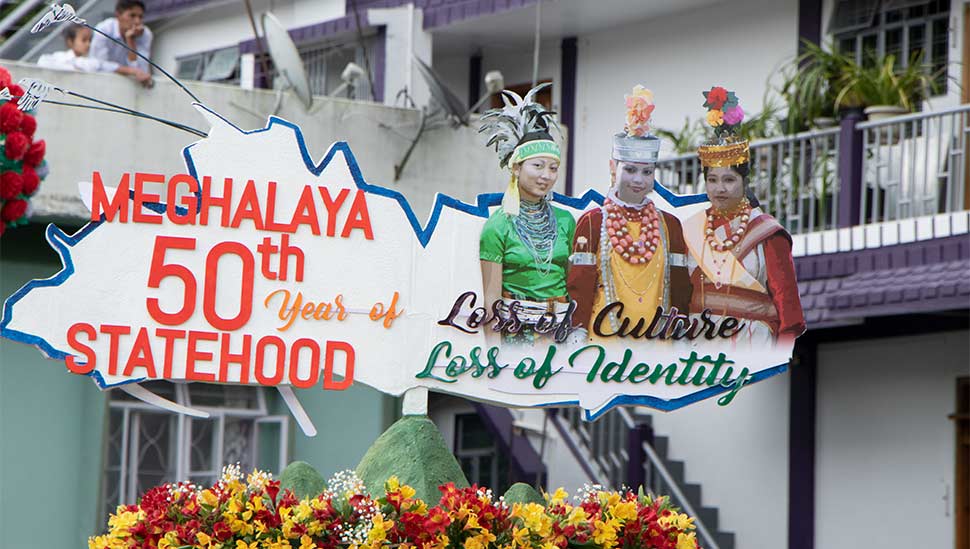Meghalaya at 50

Many of our young readers would not be familiar with the stories of the Hill State movement for lack of information on the subject. The reason could also be because the people who were involved with the movement did not put their activities in writing. The other reason could be because the generation which follows did not see it important to document such an important people movement. The unfortunate outcome of this attitude is that, the future generation was denied of the very important part of the history of this young state.
In the absent of any form of tangible records of the history of the movement, young people were denied of the opportunity to learn and know about the influential personalities who had led the movement to success. In the absent of such records, we were also denied of the opportunity to look back and appreciate the efforts put up by the people particularly the leaders of the hills state movement towards achieving this very important goal.
I was born five years before the state was carved out of the composite state of Assam, so what I learned about the hill state movement was from a second hand sources. It is also very unfortunate there is still no book which deals comprehensively on the hills state movement on the book stand in the state till today. After 50 years have lapsed, one wonders if there is even a study done on the hill state movement.
In such a situation for the generation of people who live fifty years after the statehood was granted to the people, they were left with very little or no history about the movement. With no history to look back, the question that we need to ask is ‘what is there for us to be proud of our statehood’ or fifty years since the state was created, is there anything that the people can to be proud of their state? Let us begin by examining how the state has fared in its fight against the old and common enemy of the people that is Poverty, Ignorance and Diseases (PID).

It will be unfair to say that the economy of the state has not improved in the last fifty years since the beginning of the journey of the state. We have roads where none has existed before and we have improved on the roads that have existed before. The only question is about the quality of the state roads which are in poor condition. The conditions of these roads left much to be desired due to the contractor-politician nexus, but the quality of roads constructed under central scheme like PMGSY are much better even of those roads constructed under RIDF which is a loan provided by NABARD.
Although surveys have established that numbers of landless people in the state have increased, yet we do not have report of people die of starvation in the recent years. In the last 50 years many farmers have finally graduated from being mere subsistence farmers and started to engage into commercial farming. Yet their income has not improved as expected because the market is still being controlled by the intermediaries or middlemen. The truth is lives of the farmers have improved not because of the government’s intervention but despite the intervention.
In the field of education too, the development and progress that we see is despite the government intervention. The fast pace development in communication and technologies that we see also happened with very little support from the government. In fact had it not been for the involvement of the private agencies and primarily faith organization, the state would not have seen progress in education as we are witnessing now.
Similarly in health care sector, private agencies which include churches have contributed immensely in the providing health care to the people. The government health care institutions (those in the rural areas in particular), still lack necessary manpower, basic medical equipments like x-ray and the government many a time even failed to supply basic drugs to the centers.
On the eve of the 50th statehood what is our hope for the next 25 years? In the state’s battle against poverty, it is not enough to put entire emphasis just on the rural areas and the farmers in particular in the next 25. The state has grown in leaps and bound and urban areas have developed in the state in the last 50 years. The state which started with three districts and their respective headquarters has experience exponential growth in the last 50 years. From three there are now 12 districts with equal numbers of headquarters in the entire state. In all these emerging urban areas, numbers of urban poor has also increases in these towns and cities. In the next 25 years, government should also put more efforts in tackling the problems face by the urban poor too.
While one may say that the state has done well in providing education from lower to secondary section, higher education is still beyond the reach of the poor section of the population. It is important to make higher education accessible to every section of the population. The need of the hour is for the state to provide free higher education at the door step of the people.
The government still has a lot of work to do with regard to providing health care to all section of the population. In the next 25 years it needs to ensure that PHCs and CHCs have the required man powers and also equipped the centers with the necessary medical infrastructures. The PHCs and the CHCs should also be able to provide medicines to the people who visited these centers.
The most important learned from the last 50 years is for the state to be able to develop and rid itself of PID problems, its people need to wholeheartedly engage in the democratic process and all times. Right now the people of the state engaged in democratic process only once in five years, that is during election time only. The citizens of the state seem to understand that their democratic engagement started in the election and ends with the election of their respective legislators of council members only. This has to change sooner than later.
For the state to be able to achieve its full potential, we need to have legislators who understand their role and responsibilities as a leader of a democratic state. For the state to be able to develop, the people of the state should understand the basic principle of democracy, that democracy is the government of the people, for the people and by the people.

Leave a Reply